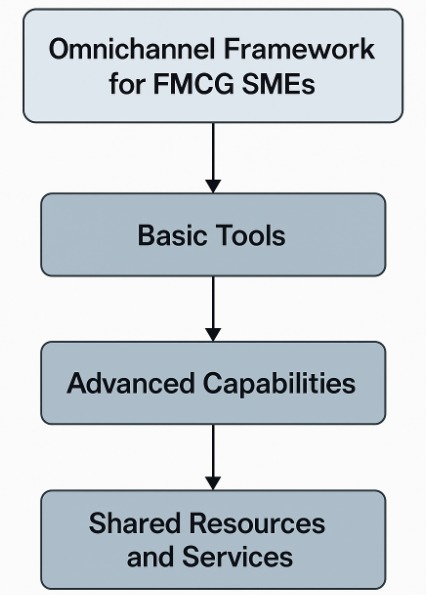In an era marked by digital transformation and rapidly evolving consumer expectations, the structure and function of supply chains have undergone a fundamental shift. What was once viewed as a backend operational necessity has now become a strategic driver of competitive advantage and customer satisfaction. Nowhere is this shift more pronounced than in the fast-moving consumer goods (FMCG) sector, where the pace of change and the scale of customer demand require businesses to be faster, more responsive, and more intelligent in how they move products from source to shelf.
For small and medium-sized enterprises (SMEs), which make up the vast majority of businesses globally, these pressures are even more acute. Unlike multinational corporations with expansive logistics budgets and in-house digital teams, SMEs often operate with limited capital, fragmented infrastructure, and reduced access to advanced technologies. Yet despite these constraints, they remain essential engines of employment, local innovation, and economic growth.
Ngodoo Joy Sam-Bulya, a supply chain strategist and research leader based in Nigeria, is emerging as one of the most important thinkers working at the intersection of supply chain innovation, SME empowerment, and inclusive economic development. Her recently published scholarly article, titled “Omnichannel Strategies and Their Effect on FMCG SME Supply Chain Performance and Market Growth,” provides a comprehensive and highly practical roadmap for how SMEs can transform their operations through omnichannel models. While her research is rooted in the realities of African markets, its insights resonate just as strongly in the United Kingdom and other advanced economies where SMEs also face the challenge of modernizing their logistics systems under tight economic pressures.

Ngodoo Joy Sam-Bulya
Co-authored as part of a multidisciplinary study into the evolving dynamics of SME logistics, the paper explores how omnichannel strategies — which integrate in-person retail, digital commerce, mobile ordering, and connected logistics — can enhance efficiency, profitability, and resilience for small businesses. What distinguishes Sam-Bulya’s voice in the discussion is not just her analytical rigor but her emphasis on practicality, inclusion, and cross-sectoral collaboration.
To understand the full scope of her argument, it is necessary to view it in the context of SME economic significance in both Nigeria and the United Kingdom. In Nigeria, SMEs represent 96 percent of all registered businesses and account for approximately 84 percent of employment, according to data from the Small and Medium Enterprises Development Agency of Nigeria (SMEDAN). In the United Kingdom, SMEs are similarly central to the national economy. According to the UK Department for Business and Trade, SMEs comprise more than 99 percent of all businesses and generate 61 percent of employment. They contribute over £2.4 trillion to the economy each year.
Yet in both countries, these enterprises face substantial barriers in adapting to a logistics environment that is becoming increasingly digital, consumer-driven, and data-intensive. In the UK, SMEs must grapple with regulatory changes following Brexit, rising input costs, and labor shortages that affect warehousing and distribution. In Nigeria, the barriers are infrastructural — including unreliable transport systems, inconsistent internet access, and the predominance of informal market practices. Despite the differences in context, the fundamental challenge is the same: how can small businesses compete in a market that demands speed, visibility, and customer-centric agility?
This is where Sam-Bulya’s work is particularly valuable. Her research offers a solution that is at once technologically grounded and context-sensitive. “Omnichannel integration allows SMEs to align their inventory with consumer demand in real time,” she writes. “But more importantly, it provides the structural backbone to deliver consistency, personalization, and speed — key expectations of the modern consumer.”
In the United Kingdom, this model is already being embraced by large retailers such as Tesco and Marks & Spencer, where consumers routinely move between online and offline experiences with minimal friction. However, as Sam-Bulya argues, the same model can and should be extended to SMEs. Whether in Lagos or London, SMEs can benefit from the ability to receive orders online, manage fulfillment through local logistics partners, and allow for flexible in-store pickups or mobile transactions. The key is designing systems that are accessible, scalable, and tailored to the specific capacities and needs of smaller businesses.
Sam-Bulya’s framework emphasizes a phased approach to omnichannel adoption. Rather than pushing SMEs toward expensive, fully automated platforms from the outset, she encourages gradual adoption starting with mobile inventory apps, simple point-of-sale systems, and basic integration of delivery services. As SMEs build confidence and capacity, they can layer on more advanced tools such as cloud-based dashboards, predictive analytics, and logistics automation.
What makes her work stand out is its grounding in practical experience. Rather than offering abstract or overly technical prescriptions, she outlines solutions that reflect the lived realities of small business owners. For instance, she highlights the use of third-party logistics providers (3PLs) as a way for SMEs to overcome the prohibitive costs of owning their own delivery fleets or warehouses. In both Nigeria and the UK, where local delivery services have expanded rapidly due to e-commerce growth, SMEs can outsource logistics functions while retaining control over the customer experience.
She also proposes cooperative models where SMEs in the same market can share warehousing, digital tools, or delivery networks. This not only reduces cost but also builds trust and community resilience. These models are especially relevant to rural parts of the UK, where SMEs often face limited access to centralized logistics infrastructure.
Sam-Bulya is also deeply committed to inclusive growth, particularly in ensuring that women entrepreneurs are not left behind in the digital logistics revolution. As a woman working in a predominantly male-dominated field, she brings a gender-aware perspective that highlights the specific barriers women face in accessing finance, digital tools, and supply chain resources. She argues that omnichannel platforms — particularly those based on mobile commerce — offer new pathways for women to operate businesses without needing large physical storefronts or heavy logistical investments.

In a recent interview, Sam-Bulya elaborated on her ongoing work to translate these ideas into action. “We are currently developing a project that uses predictive analytics to improve demand forecasting for perishable goods in urban slums,” she explained. “We are looking at how data models can help micro-retailers in informal settlements plan inventory better and reduce waste.” She also shared that she is working with logistics startups to test micro-fulfillment centers in underserved communities. These small-scale distribution hubs are designed to cut last-mile delivery costs and increase responsiveness in areas often overlooked by traditional supply chains.
Her commitment to data-driven and socially inclusive innovation reflects a broader global consensus that resilient supply chains must serve all stakeholders. A 2023 report by the World Economic Forum declared that supply chain modernization — especially for SMEs — is central to national and international economic recovery. Sam-Bulya’s research contributes to this vision by proposing practical frameworks, identifying scalable technologies, and emphasizing collaboration across public and private sectors.
Her influence is already visible. In Nigeria, innovation hubs in Abuja and Lagos have begun testing omnichannel models based on her proposals. In the UK, her research is attracting attention among development organizations, business councils, and public policy forums exploring how to empower SMEs in rural communities and underserved economic regions. Her work complements ongoing efforts by the British Business Bank, Innovate UK, and regional Chambers of Commerce to expand digital capability among small enterprises.
What also distinguishes Sam-Bulya is her refusal to view technology as an end in itself. Unlike many tech-forward approaches that prioritize automation, artificial intelligence, or blockchain, her framework places people at the center. Her vision of logistics is as much about coordination, fairness, and visibility as it is about speed and scale. She describes her approach not in terms of industry jargon but with the simple but powerful phrase: “building ecosystems, not just enterprises.”
This ethos of ecosystem building is particularly relevant in the post-pandemic world, where supply chains continue to face pressure from inflation, conflict, extreme weather events, and shifting consumer patterns. In Latin America, only 30 percent of SMEs have access to digital sales tools. In Southeast Asia, fragmented logistics networks inflate costs and undermine service quality. And in the United Kingdom, businesses are navigating the complex legacies of Brexit, fluctuating labor availability, and regional trade disparities.
In all these contexts, Sam-Bulya’s message is consistent. Empowering SMEs to adopt integrated logistics solutions is not merely a technical challenge — it is an economic, social, and ethical imperative. Her work underscores the urgency of coordinated investment, education, and technology adoption strategies that can help SMEs participate fully in national and global economies.
She is not just an analyst of systems. She is a builder of futures.
When asked about her long-term vision, Sam-Bulya speaks with both conviction and humility: “The goal is to build a supply chain ecosystem where SMEs of all sizes, across all geographies, have the tools and knowledge to meet demand quickly, sustainably, and profitably.”
As the UK reimagines its economic model for a new global era — one centered on regional growth, digital inclusion, and green innovation — the lessons embedded in Sam-Bulya’s work are increasingly relevant. Her contributions offer practical pathways for transforming not only how goods move through our economies but how value is created and shared along the way.
In an industry too often dominated by hyper-automation and buzzwords, Ngodoo Joy Sam-Bulya’s voice is refreshingly grounded, rigorously insightful, and profoundly human. Her work reminds us that the future of supply chains will not be built solely by algorithms or machines, but by people with the vision to connect commerce with community, efficiency with empathy, and ambition with equity.
That future, in many ways, is already being built — and Sam-Bulya is helping lead the way.
































